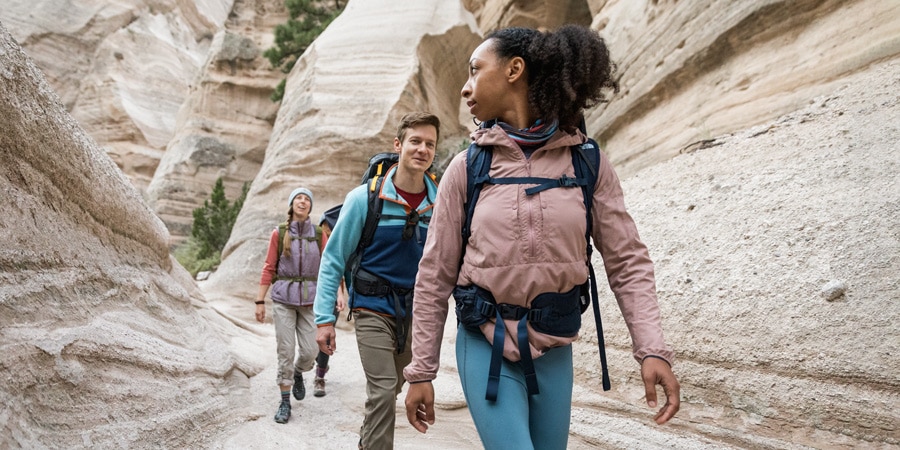When you first start hiking it can be difficult to know exactly what to bring with you. This is especially true if you’re used to day hikes and are now venturing into backpacking. The amount of gear you need will depend on the length of your hike, the terrain, and the weather conditions.
However, there are some basic items that every hiker should bring, regardless of the circumstances.
When you hit the trails for a hike, it’s important to be prepared. Whether you’re a beginner or an experienced hiker, knowing what to bring on your hike is essential for a safe and enjoyable experience.
Here are a few items that every hiker should bring:
1. Water and snacks. It’s important to stay hydrated and fueled while hiking, so pack plenty of water and some high-energy snacks like nuts or fruit.
2. A map of the area.
This will help you navigate your way and find your way back if you get lost.
3. First-aid supplies. Pack a basic first-aid kit in case of any minor injuries or illnesses.
4. Appropriate clothing and footwear. Make sure you dress for the weather conditions and wear comfortable shoes that provide good support.
5 Bits of Hiking Gear I Wish Beginners Would Use (But They Don't)
How Many Miles Should a Beginner Hike?
Most beginners start by hiking shorter distances of 5-10 miles. Once you get a feel for hiking and what gear you need, you can start tackling longer hikes. Some experienced hikers can hike 20+ miles in a day, but most people average 10-15 miles per day.
What are the 9 Tips That You Need to Prepare before Going to a Hike?
Assuming you would like tips for preparing for a hike:
1. Choose the right gear- Depending on the climate and terrain, make sure to pack the appropriate clothing and footwear. Layering is key to being comfortable in a range of conditions.
2. Don’t forget the 10 essentials- A map, compass, sunglasses and sunscreen, headlamp or flashlight, first-aid kit, fire starter, matches, knife, shelter and extra food are all crucial items to bring along on any hike.
3. Know your limits- It’s important to know both your physical and mental limitations before heading out. Choose a trail that is within your abilities in order to avoid getting in over your head.
4. Check the weather forecast- This will help you determine what gear to pack as well as give you an idea of what conditions you can expect on the trail.
5. Tell someone where you’re going- It’s always a good idea to let someone else know where you plan on hiking as well as when you expect to be back. That way if something does happen, they will know where to start looking for you.
What are the 3 Basic Skills in Hiking?
There are three basic skills in hiking: map reading, compass use, and trip planning.
Map reading is the ability to read a topographic map and understand the terrain it represents. A topographic map shows the contours of the land, as well as features such as water bodies, trails, and man-made structures.
Map reading skills are necessary in order to determine your location, plan your route, and estimate travel times.
Compass use is another essential skill for hikers. A compass can be used to help find your way if you get lost, or to navigate around obstacles such as cliffs or rivers.
It is also useful for planning purposes, helping you determine which direction you need to travel in order to reach your destination.
Trip planning is the third basic skill that all hikers should have. This involves choosing a route based on your fitness level and the amount of time you have available.
It also means being aware of potential hazards along the way and making sure you have the necessary supplies (food, water, first-aid kit) for a safe and enjoyable hike.

Credit: www.rei.com
5 Essential Things to Bring in Hiking
When you hit the trails, it’s important to be prepared. Whether you’re going on a day hike or an overnight camping trip, bringing along the essentials will help make your hike more enjoyable. Here are five things you should always bring with you when hiking:
1. Water and snacks: Staying hydrated and fueled is key to having a good time on the trail. Bring plenty of water and some high-energy snacks to keep your energy levels up.
2. A map: Knowing where you are and where you’re going is critical, especially if you’re hiking in unfamiliar territory.
Make sure to pack a map of the area so you can stay on track.
3. First-aid kit: You never know when an emergency might occur, so it’s always best to be prepared with a first-aid kit. Include items like bandages, antiseptic wipes, and pain relievers just in case someone gets injured while on the hike.
4. Flashlight: Even if you’re planning on finishing your hike before dark, it’s always a good idea to bring along a flashlight in case something happens and you end up being out after sunset. Pack extra batteries too, just in case!
5 .
Hiking boots or shoes: Comfort is key when spending hours on the trail, so make sure to wear proper footwear that will support your feet and ankles throughout the hike .
What to Bring on a Short Hike
Assuming you have the essentials like water and a map, here are some other items you might want to consider bringing on a short hike:
A daypack – This will help you carry everything you need without being too bulky or uncomfortable.
Sunscreen and sunglasses – Even if it’s not super sunny out, UV rays can be harmful.
Bug spray – No one likes dealing with pesky bugs!
Sunhat – Again, protecting yourself from the sun is important. A sunhat will help keep your face and head cool and protected from the sun.
snacks and lunch – You’ll probably get hungry during your hike, so it’s always good to have some snacks and maybe even a packed lunch with you.
First-aid kit – Just in case anyone gets hurt, it’s always good to have a first-aid kit handy.
Multi-purpose tool – A knife or multi-purpose tool can come in handy for all sorts of things, from opening food packaging to making impromptu repairs.
Hiking boots or shoes – comfortable footwear is key when hiking! Make sure to break in your shoes before hitting the trail so you don’t end up with blisters.
Hiking Essentials List
There are many items that you should consider bringing with you on a hike, but here are ten of the most essential items:
1. A Good Pair of Hiking Boots: A good pair of hiking boots is perhaps the most important item on this list. They need to be comfortable, durable, and provide good traction.
Look for a boot that has a waterproof and breathable membrane to keep your feet dry and comfortable.
2. Socks: Bring along at least two pairs of socks, preferably ones that are made from wool or synthetic materials. These will help to wick away moisture and keep your feet warm and dry.
3. map & Compass: Always bring a map and compass with you, even if you think you know the area well. You never know when you might get lost or turned around, so it’s always best to be prepared.
4 .
extra clothing layers: Be sure to pack extra clothing layers in case the weather turns cold or wet. A windbreaker jacket and rain pants are always good to have on hand.
5 .
First-aid kit : It’s always a good idea to bring along a small first-aid kit stocked with Band-Aids, gauze pads, antibiotic ointment, etc.
6 .Sunscreen & sunglasses: Don’t forget the sunscreen!
Even on cloudy days, UV rays can penetrate through the clouds and damage your skin. Pack sunglasses too to help protect your eyes from the sun’s glare off of snow or water..
7 .hat : A hat can help protect your face from sunburn as well as keep your head warm in colder weather..
8 .Hiking poles : Hiking poles can take some of the strain off of your legs by providing added support when walking uphill or downhill..
9 .snacks & lunch : Don’t forget to pack snacks and lunch! Eating regularly will help keep up your energy levels during a long day out on the trail..
10 .water bottle : Last but not least, be sure to bring plenty of water with you; at least 2 liters per person is recommended..
Conclusion
A beginner’s guide to packing for a hike may seem daunting, but it doesn’t have to be! Here are a few essential items to bring on your next hike, whether you’re hiking for an hour or a weekend.
First and foremost, make sure to pack plenty of water and snacks.
Depending on the length and intensity of your hike, you may want to pack more or less food. A good rule of thumb is to pack one snack per hour of hiking.
Next, don’t forget to pack some form of first-aid in case of any minor injuries.
This could be anything from band-aids and antiseptic wipes to a small first-aid kit.
Finally, make sure you have the proper footwear for your hike. comfortable shoes with good traction will help you enjoy your hike and avoid any slips or falls.
